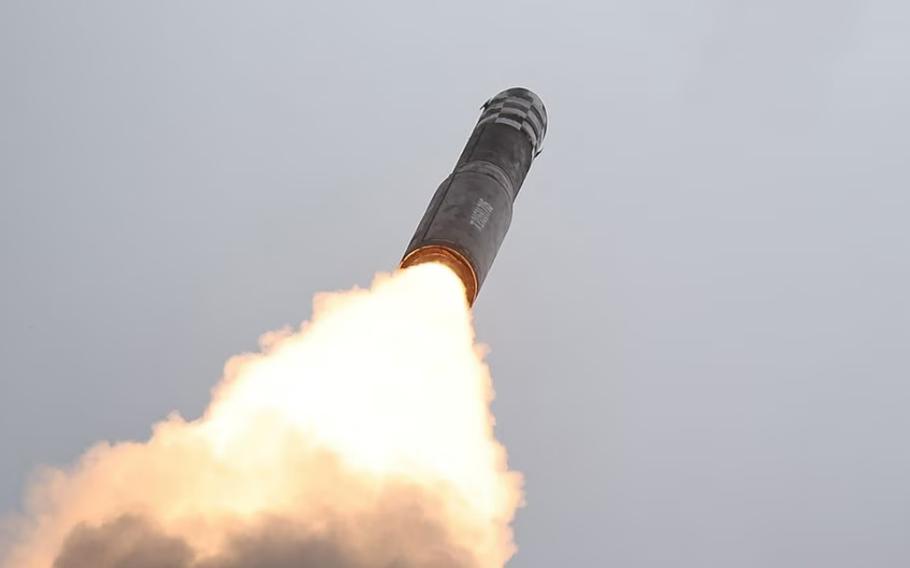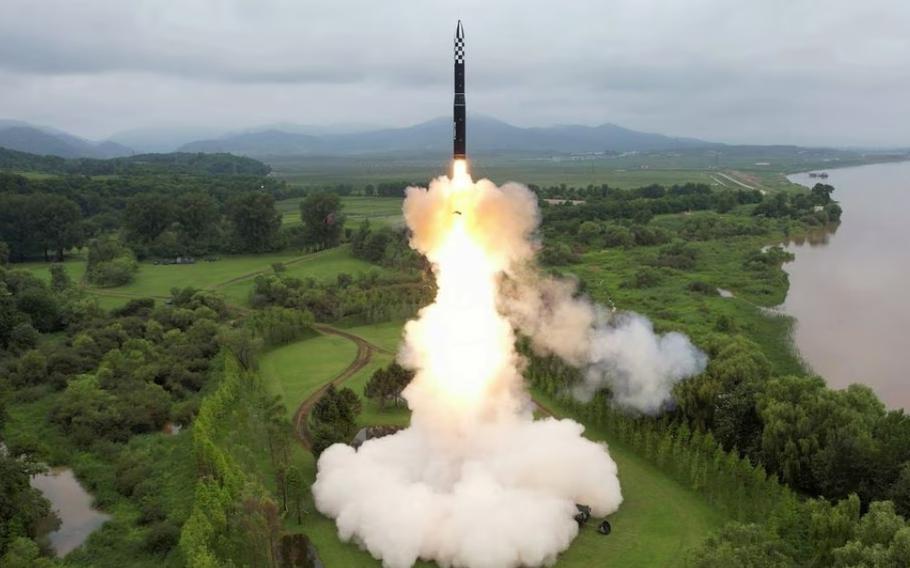
North Korea launches a Hwasong-18 intercontinental ballistic missile in this image released by the state-run Korean Central News Agency, July 13, 2023. (KCNA)
SEOUL, South Korea — Representatives of the U.S., South Korea and Japan are scheduled to meet Thursday to discuss North Korea’s recent ballistic missile tests and luring the communist regime back to “substantive negotiations.”
Sung Kim, the U.S. special representative for North Korea, is expected to meet in Karuizawa, Japan, with Funakoshi Takehiro of the Japanese Foreign Ministry and Kim Gunn, the South Korean special representative for Korean Peninsula peace and security affairs, according to a State Department news release Monday.
North Korea carried out its most recent test on July 12, a solid-fueled Hwasong-18 intercontinental ballistic missile. The regime has fired 15 ballistic missiles in 11 separate days of testing so far this year.
The ICBM flew for a record 74 minutes from the Pyongyang area before splashing into the Sea of Japan, or East Sea, about 155 miles west of Okushiri Island.
Shortly after the test, Kim, Takehiro and Gunn conferred and “strongly condemned” the firing, South Korea’s Ministry of Foreign Affairs said the same day.
The ministry said North Korea violated U.N. Security Council resolutions prohibiting it from testing ICBMs, which the communist regime “cannot justify for any reason.”

North Korea launches a Hwasong-18 intercontinental ballistic missile in this image released by the state-run Korean Central News Agency, July 13, 2023. (KCNA)
North Korea’s ICBM came down in Russia’s exclusive economic zone, Mohamed Khaled Khiari, the U.N. assistant secretary-general for Middle East, Asia and the Pacific, said at a Security Council briefing Thursday in Washington, D.C, according to a meeting summary.
Russia’s state-owned TASS news agency on Saturday said the Russian military is investigating the claim. The exclusive economic zone stretches 200 nautical miles beyond a nation’s 12-mile territorial limit.
On Tuesday, the U.S. and South Korean Nuclear Consultative Group met in Seoul to discuss bolstering their nuclear deterrent against the North.
The state-run Korean Central News Agency routinely characterizes Pyongyang’s missile tests as a necessary precaution against U.S. and South Korea’s military alliance.
The ICBM test was part of “an essential process aimed at further developing the strategic nuclear force of [North Korea] and, at the same time, serves as a strong practical warning” against Washington and Seoul, according to a KCNA report Thursday.
North Korea’s missile tests brought Washington, Tokyo and Seoul to “work even more closely together than was already the case,” U.S. Secretary of State Antony Blinken said Friday before meeting with Japanese Foreign Minister Hayashi Yoshimasa and South Korean Foreign Minister Park Jin in Jakarta, Indonesia.
Warships from the three countries practiced their ballistic missile defense Sunday in the Sea of Japan.
The guided-missile destroyer USS John Finn joined the Japanese destroyer JS Maya and South Korean destroyer Yul Gok Yi I to demonstrate “the strength of the trilateral relationship,” according to news releases from U.S. Indo-Pacific Command and South Korea’s Ministry of National Defense on Sunday.